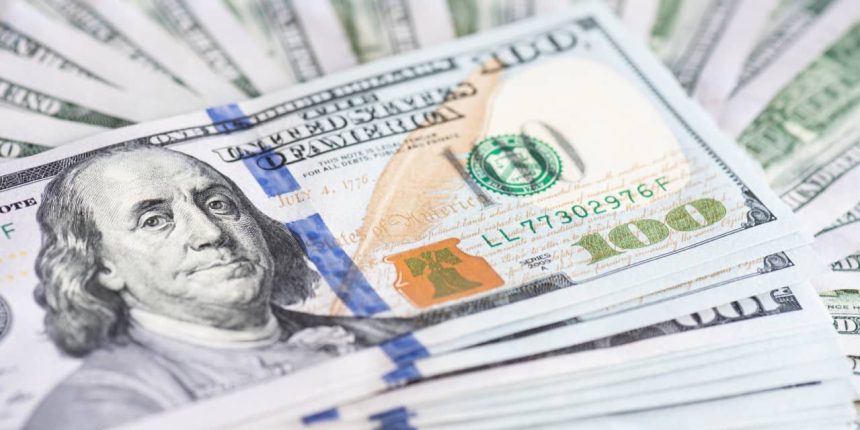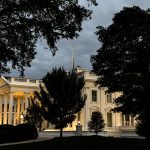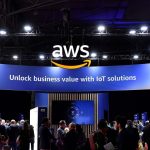The U.S. economy is standing tall despite the most aggressive rate-hiking campaign in a generation.
Gross domestic product grew at an annual rate of 4.9% in the third quarter, the fastest in almost two years. All things considered, that’s pretty astonishing.
More than a year ago, Federal Reserve Chairman Jerome Powell warned that reducing inflation would cause economic pain for households and businesses. Inflation is indeed coming down, yet the juggernaut that is the U.S. economy has been showing remarkable resilience.
Consumers continued to defy expectations of a slowdown in spending, while residential construction growth also was a big driver in the third quarter. In the environment of high interest rates, consumers and businesses are weathering the storm, which is looking more like a breeze right now.
But a storm may still be coming. The factors that have so far allowed households to be so resilient won’t last forever. Excess savings, built up during the pandemic, are being depleted and households are spending more on debt payments. The Fed’s rate hikes eventually will have an impact, and the central bank seems intent on keeping rates high for a while yet.
The fourth quarter also is unlikely to be anywhere near as good, which may explain why markets still see a 99% chance of the Fed pausing rates next week rather than a rise.
Strong growth and falling inflation is a perfect scenario for the Fed, but with geopolitical tensions keeping oil prices elevated that could quickly become slowing growth and sticky inflation.
—Callum Keown
*** Join OPIS Energy Insights and analysts from Chemical Market Analytics today at noon as they talk about how falling demand for gasoline and other fossil fuels creates a challenge for plastic and chemical producers. As less fuel is produced, petrochemical costs could rise — and lift prices for plastics in consumer products, from beverage bottles to car components to clothing. Sign up here.
***
Yellen Says Economic Trends Shows Signs of Soft Landing
Treasury Secretary Janet Yellen said at an event on Thursday that there were no signs of a recession. Instead, Yellen said the economy looks like the makings of a soft landing. Her comments came after a stronger than expected report on gross domestic product fueled by consumer spending.
- Third quarter GDP rose 4.9% as elevated consumer spending on goods and services fueled an expansion despite rising interest rates and higher prices. It also was a sharp acceleration from the 2.1% gain in the second quarter.
- Residential construction and government investment helped make for the strongest quarterly growth since late 2021. But most forecasts suggest growth has slowed in recent weeks. The third-quarter GDP reading is likely to keep the Federal Reserve on track to hold interest rates steady next week.
- Consumer spending rose at a 4% annual pace and contributed more than half of the quarter’s overall expansion, Jeffrey Roach, chief economist with LPL Financial, noted. That compares with the previous quarter’s 0.8% pace, and was the fastest growth rate for the category since mid-2021.
- It is unlikely consumers will maintain that level of spending. Incomes rose in the third quarter, but more households are now running down savings and spending more on debt payments. The personal saving rate fell in the third quarter to 3.8%, from 5.2% in the second quarter.
What’s Next: Yellen also said she didn’t expect growth to stay at the third quarter level, predicting instead it could come in at 2.5% for the year. She added that the economy is showing “tremendous robustness” and rates would likely stay higher for longer.
—Liz Moyer and Megan Cassella
***
Amazon Boosts Sales and Profit as Cloud, Retail Notch Gains
Amazon’s
third-quarter sales accelerated from the June quarter and profit nearly tripled, fueled by results from cloud computing, advertising, and retail divisions. But its fourth quarter outlook for sales of $160 billion to $167 billion was slightly below Wall Street’s expectations.
- Revenue rose 13%, faster than the 11% in the second quarter and near the high end of Amazon’s guidance. CEO Andy Jassy said Amazon’s cloud-business growth stabilized and that changes to its delivery operations helped with costs and efficiency.
- Amazon Web Services revenue rose 12.3% from last year to $23.1 billion, about the same pace as the second quarter. Heading into the third quarter, AWS growth had decelerated for a year and a half, reflecting a customer focus on wringing more value from their growing cloud spending.
- Revenue in its advertising segment rose 26% to about $12 billion. That beat expectations and outpaced the quarterly growth for each of the past three quarters on a constant currency basis.
- In its e-commerce business, Amazon got a boost from its annual Prime Day event in July. Online store sales rose 7%, to $57.3 billion, improving from 4% growth in the June quarter, and third-party services revenue rose 20%, versus 18% growth in the June quarter.
What’s Next: Amazon got an early jump on holiday sales by adding a second Prime sales event this month. It plans to hire 250,000 people for its warehouses in full-time, part-time and seasonal roles for the holidays.
—Eric J. Savitz and Liz Moyer
***
Sam Bankman-Fried Takes the Stand in FTX Fraud Trial
Sam Bankman-Fried, founder and former CEO of defunct crypto exchange FTX, testified at his criminal fraud trial on Thursday without the jury present after federal prosecutors objected to his plan to testify about lawyers participating in FTX’s decision-making.
- U.S. District Judge Lewis Kaplan criticized Bankman-Fried for being evasive in his answers. The trial began Oct. 4 and featured testimony by several former close lieutenants of Bankman-Fried. In cross examination, Bankman-Fried couldn’t remember whether he had conversations with lawyers about key decisions.
- He also said he was “not sure” who decided initially to use a subsidiary of FTX related company Alameda Research to take in customer funds from FTX. Prosecutors accuse him of a conspiracy to misuse $10 billion of customer funds. He has pleaded not guilty.
- The defense focused on Bankman-Fried’s reliance on what the firm’s lawyers told him. Bankman-Fried said he “skimmed” versions of FTX’s terms of service, which were drafted by in-house and outside lawyers for the firm. Lawyers decided to structure promissory notes for payments from Alameda to Bankman-Fried and others as loans.
- Bankman-Fried testified during questioning from his own lawyer that he took comfort that the lawyers had structured the loans. He also said he believed that under FTX’s terms of service, Alameda was allowed in many circumstances to borrow funds from the exchange.
What’s Next: Kaplan said he expects to hand the jury the case for deliberation sometime next week, according to CNN. Bankman-Fried returns to the courtroom Friday for more testimony.
—Liz Moyer
***
GM’s Cruise Suspends All Driverless Car Operations After Setback
General Motors
’ robotaxi company Cruise has now halted its entire driverless fleet nationwide after its license to operate in California was suspended earlier this week. Cruise said it needs to take steps to rebuild public trust, “even if it means doing things that are uncomfortable or difficult,” in a post on X, formerly Twitter, late Thursday.
- The California ban is related to an accident, the state’s Department of Motor Vehicles (DMV) confirmed Tuesday. The DMV also said the performance of the vehicles wasn’t meeting expectations, the company may have misrepresented its data, and the company might have made choices at odds with public safety.
- The DMV cited three state regulations for the suspension but it largely stems from safety concerns following an accident. “In [an] incident being reviewed by the DMV, a human hit-and-run driver tragically struck and propelled the pedestrian into the path of the AV,” said GM in an emailed statement earlier in the week.
- “We have decided to proactively pause driverless operations across all of our fleets while we take time to examine our processes, systems, and tools and reflect on how we can better operate in a way that will earn public trust,” the company said in the post.
What’s Next: It’s a setback for GM which has owned part of Cruise since 2016. The auto maker has plans to expand its driverless taxi service across the U.S. and has forecast that Cruise could generate $50 billion in annual sales by 2030.
—Callum Keown
***
Ford Withdraws 2023 Guidance After Tentative UAW Deal
Ford Motor
withdrew its guidance for 2023 because of its tentative contract with United Auto Workers that could potentially end a more than month-long strike. Revenue rose in the third quarter, boosted by sales of pickup trucks, but results overall were still lighter than analysts expected.
- Revenue rose 11% from last year to $43.8 billion. Pretax profit, excluding one-time items, was $2.2 billion. Wall Street was expecting operating profit of $2.6 billion from sales of $43.9 billion. In July, Ford forecast pretax profit for 2023 in a range of $11 billion to $12 billion.
- Ford has estimated that the six-week UAW walkout will cost it about $1.3 billion in adjusted earnings over two quarters. The agreement, subject to UAW member approval, would raise wages 25% and restore cost-of-living adjustments. JPMorgan estimated it would add $1.5 billion to Ford’s yearly labor cost.
-
Ford’s EV business, called Model e, reported a $1.3 billion loss on sales of 36,000. The business lost $1.1 billion in the second quarter on sales of 34,000 vehicles. Results were affected by lower pricing after rival
Tesla
cut its prices. - CFO John Lawler said the business is improving even if at a slower-than-hoped-for rate. About $12 billion in EV capital spending is being postponed. A battery plant in Kentucky will be delayed to balance supply and demand, while production of the Mustang Mach E production is slowing down.
What’s Next: Ford’s hourly labor cost, including benefits, would be around $67 this year and rise to $88 by 2027,
Wells Fargo
analysts said. That compares with the hourly labor costs of foreign auto makers, estimated in the mid-$50s, and Tesla’s range of $45 to $50, The Wall Street Journal reported.
—Al Root and Liz Moyer
***
Do you remember this week’s news? Take our quiz below to test your knowledge. Tell us how you did in an email to [email protected].
1. This week featured another big deal in the energy sector, as companies flush with cash and benefiting from rising oil prices are on the hunt. Which of the following were involved in the $53 billion deal?
a.
Chevron
and Hess
b.
Exxon Mobil
and
Pioneer Natural Resources
c.
ConocoPhillips
and
Occidental Petroleum
d. None of the above
2. This investment manager sparked a rally in Treasury bonds by telling the world the firm had covered its bearish short bet on the market. Which so-called Bond King was it?
a. Jeffrey Gundlach
b. Bill Ackman
c. Bill Gross
d. Dan Ivascyn
3. A group of 41 state attorneys general have sued this social media company in federal and state courts, accusing it of creating addictive features for its platforms that harm young users:
a. TikTok
b. Snap
c. BeReal
d.
Meta Platforms
4. Newly elected House Speaker Mike Johnson (R., La.) has a number of pressing legislative priorities to knock off on a tight deadline while trying to bring together warring factions among the GOP lawmakers in the chamber. Which of the following are on his list?
a. A Nov. 17 deadline to reach a government funding agreement or extend it a second time.
b. The Biden administration’s request for $106 billion in aid for Israel, Ukraine and other national security interests.
c. The White House’s request for $23.5 billion for disaster relief after the Maui wildfires, flooding in California and Vermont, and other disasters.
d. All of the above
5. UFC, the mixed martial arts league, has named which of the following as its official beer in the U.S.?
a. Modelo Especial
b. Coors Light
c. Bud Light
d. Natural Light
Answers: 1(a); 2(b); 3(d); 4(d); 5(c)
—Barron’s Staff
***
—Newsletter edited by Liz Moyer, Rupert Steiner, Callum Keown
Read the full article here




